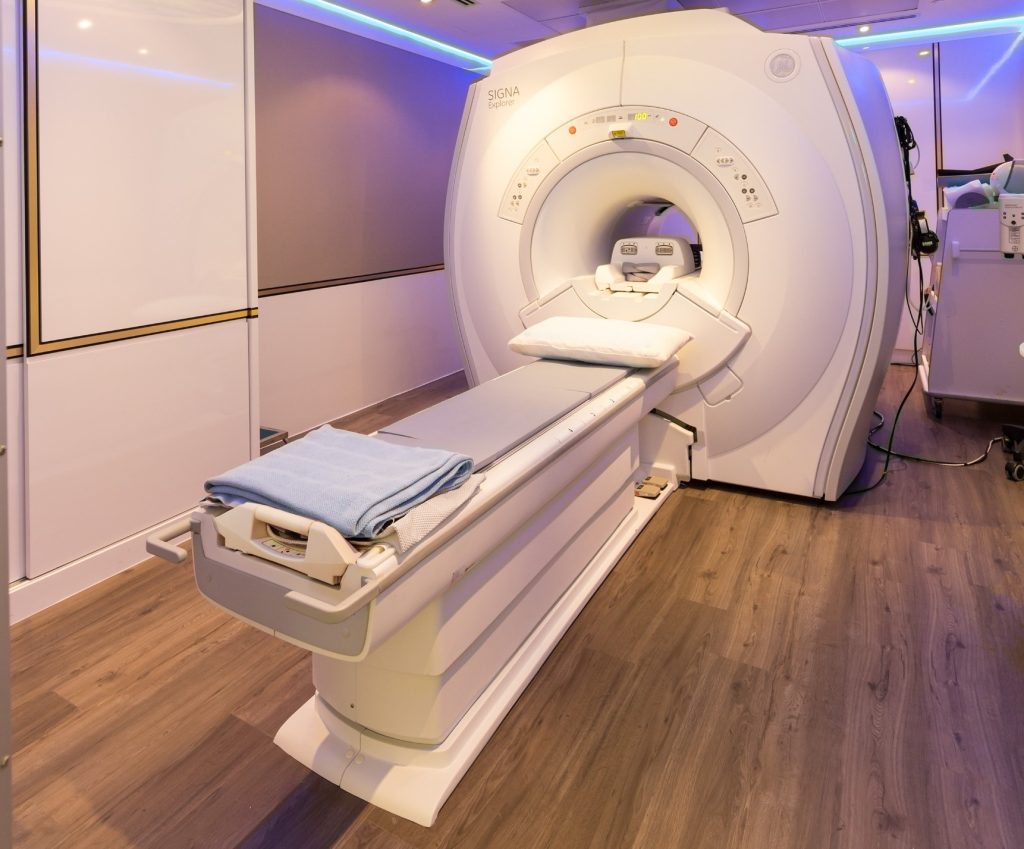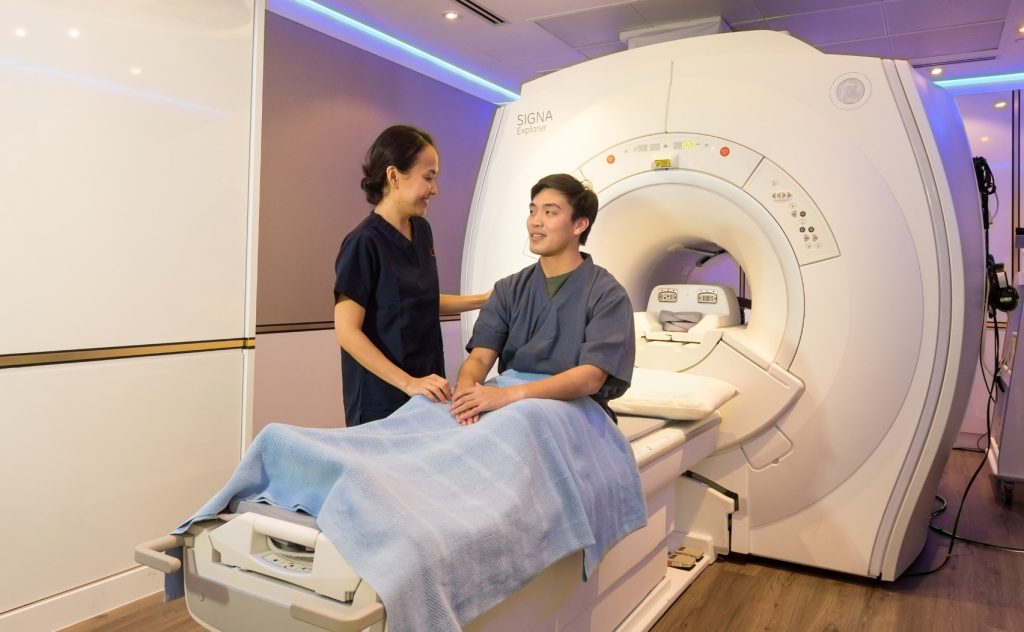


Magnetic Resonance Imaging (MRI) is a high-quality, non-invasive diagnostic tool that uses powerful magnetic fields to produce detailed images of the body’s internal organs and structures. Unlike X-rays or CT scans, MRI does not use ionising radiation, making it a safer option for patients requiring precise imaging of soft tissues, organs, and more.
Whether you are experiencing persistent pain, undergoing treatment monitoring, or need an accurate diagnosis, an MRI scan can provide crucial insights without the use of radiation.
If you are in Singapore and considering an MRI scan, you may have questions about the procedure, preparation, and where to get an MRI scan in Singapore. This guide will walk you through everything you need to know about MRI scans in Singapore—from how they work to the best places to get scanned—so that you can make an informed decision for your health.

MRI is an imaging modality which is used widely for diagnosing and monitoring various medical conditions. Its high-resolution images provide invaluable insights for detecting abnormalities and guiding treatment. MRIs are used not only in diagnostic medicine but also in medical research, treatment planning, and monitoring the progression of diseases such as cancer, neurological disorders, and musculoskeletal conditions.
Following are some of the common applications of MRI scans:
With its ability to provide detailed and accurate imaging without radiation risks, MRI remains an essential tool in modern medical diagnostics and treatment planning. MRI scans offer numerous advantages over other imaging techniques. This makes them a preferred choice for diagnosing and monitoring various medical conditions. Here are some key benefits:
MRI provides highly detailed and precise images of soft tissues, organs, and bones, which is not possible with a regular X-ray. This feature makes MRI particularly useful for detecting abnormalities in the brain, spine, joints, and internal organs.
Unlike X-rays and CT scans, MRI uses powerful magnets and radio waves instead of ionising radiation, making it a safer option, especially for patients who require multiple scans or long-term monitoring.
MRI scans are completely non-invasive, requiring no surgical procedures or injections (unless contrast dye is needed), ensuring a painless experience for patients.
MRI can detect medical conditions at an early stage, such as tumours, brain disorders, and musculoskeletal injuries, allowing for timely intervention and better treatment outcomes.
MRIs are particularly effective in visualising soft tissues like ligaments, tendons, and cartilage, making it invaluable for diagnosing sports injuries, arthritis, and spinal conditions.
MRI scans can be used to assess a wide range of medical issues, including neurological disorders (such as stroke and multiple sclerosis), cardiovascular diseases, abdominal conditions, and musculoskeletal injuries.

Before an MRI procedure, you will need to follow proper preparation to ensure a smooth and successful MRI experience. Here’s what you need to know:
1. Arrival and Preparation: Upon arrival, you’ll change into a gown and complete any necessary pre-scan procedures. You will be asked to remove any jewellery, hair accessories, undergarments, or other metal components. The radiographer will once again confirm that you do not have any implants or devices in the body before proceeding with the next steps.
2. Positioning: You’ll lie on a cushioned table, which slides into the MRI machine. Cushions or straps may be used to minimise movement.
3. Imaging Process: The scan typically lasts 30–60 minutes, depending on the area being examined. You’ll hear rhythmic tapping or buzzing sounds, which are part of the imaging process. You may be offered to wear a headset to minimise the loud MRI sounds during the procedure.
4. Post-Scan: If contrast was used, you’ll be monitored briefly for any side effects. Results will be shared with your referring doctor for further discussion.
MRI scans play a crucial role in modern medical diagnostics as they offer high-resolution imaging without radiation exposure. Whether you need an MRI for injury assessment, neurological evaluation, or routine health monitoring, this imaging technique provides accurate and detailed insights to aid in diagnosis and treatment.
Understanding the procedure, costs, and preparation steps for an MRI can help you make an informed decision and ensure a smooth experience.
If you suspect a medical condition requiring further investigation, consulting a doctor for a referral to an MRI scan is the first step toward better health. With its non-invasive nature and superior imaging capabilities, an MRI scan remains one of the most reliable tools for medical diagnosis and treatment planning.
If you need an MRI or have questions about the procedure, our friendly staff is here to help. Contact RadLink today to schedule your appointment and take a step towards better health with confidence.
MRI is used to diagnose a wide range of conditions, including (but not limited to):
In most cases, fasting is not required for an MRI. However, for scans like an abdominal MRI or MRCP (Magnetic Resonance Cholangiopancreatography), you may need to fast for 4–6 hours. You may contact our friendly staff at +65 6836 0808 should you want any clarifications.
An MRI scan typically takes 30 to 60 minutes, depending on the examined area.
Yes, since the staff and technicians can take appropriate measures like sedation to ensure a smooth and uneventful experience. However, it’s essential to inform the staff beforehand. Wider bore MRI machines, like the MAGNETOM Lumina 3T at RadLink, provide a more comfortable experience.
Wear loose, comfortable clothing without any metal components, such as zippers or buttons. Alternatively, you may be asked to change into a hospital gown.
MRI is generally safe during pregnancy, especially after the first trimester. However, it is essential to discuss this with your doctor before the scan.
Some MRI scans require a contrast agent to enhance the visibility of specific tissues or blood vessels. Your doctor or radiologist will inform you beforehand about this requirement if necessary.
MRI scans are generally safe with minimal side effects. If a contrast agent was used, you might experience mild side effects like nausea, which typically subside quickly.
Yes, MRI is safe for children. However, sedation may be used to help the child remain still during the scan.
Yes, a doctor’s referral is required prior to proceeding with a MRI Scan.
Alternatives to MRI scans include CT scans, X-rays, and ultrasounds. The choice depends on the condition being diagnosed and your doctor’s recommendation. Every individual is different and your doctor will recommend the most suitable imaging method best tailored to your needs.
While choosing the best MRI facility in Singapore, consider factors such as:
RadLink is committed to providing diagnostic imaging services in Singapore. Our primary focus is patient care and reliable technological services, which ensure accurate and comfortable imaging experiences. Choose us for an MRI for the following reasons:
At RadLink, we utilise state-of-the-art MRI scanners which provide unmatched clarity and image quality. This effective technology ensures: